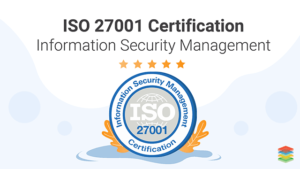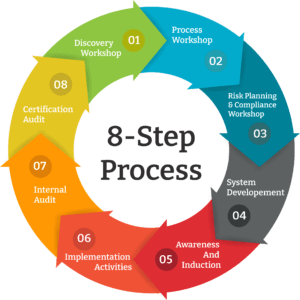Implementing ISO 27001 compliance in Qatar’s tech industry requires a detailed, tailored approach that addresses both global standards and local regulatory frameworks. Qatar’s booming technology sector, with its focus on digital transformation and cloud infrastructure, necessitates strict cybersecurity measures to protect sensitive data, ensure business continuity, and foster trust in the digital ecosystem. Here’s how tech companies can achieve ISO 27001 certification while aligning with Qatar’s cybersecurity requirements.
Regulatory Framework for Tech Companies
Tech companies operating in Qatar must navigate both international standards like ISO 27001 and local cybersecurity regulations, such as:
- Qatar National Information Assurance Policy (NIAP): NIAP provides guidelines on how companies should secure their information systems. It acts as a national baseline for cybersecurity, complementing ISO 27001 in areas like risk management, system resilience, and data protection.
- Qatar Data Privacy Law: This law governs the collection, storage, and transfer of personal data, similar to GDPR. For tech companies handling customer or employee data, aligning with Qatar’s Data Privacy Law alongside ISO 27001’s Annex A.18 (Compliance) is essential for meeting local legal requirements and ensuring data privacy.
- Q-CERT (Qatar’s Cyber Emergency Response Team): Q-CERT provides critical support in managing cybersecurity risks. Tech companies should use Q-CERT’s guidance to develop a robust Incident Response Plan (IRP) and align it with ISO 27001’s Annex A.16 (Incident Management).
- Qatar Financial Centre (QFC) Regulations: If the tech company operates in sectors like fintech or within the QFC jurisdiction, additional regulatory requirements will apply. ISO 27001 certification helps demonstrate compliance with these regulations, especially in financial technology where data security and integrity are paramount.

Information Security Management
Conduct a Comprehensive Risk Assessment and Gap Analysis
The first step in implementing ISO 27001 is performing a Gap Analysis to compare the company’s current security measures with ISO 27001 standards. This helps identify areas that need improvement, especially those critical for tech companies, such as:
- Cloud Security: With many tech companies relying on cloud services for data storage, adhering to cloud-specific standards like ISO 27017 (Cloud Security) and ISO 27018 (PII Protection in Cloud Computing) becomes critical. Ensuring secure cloud configurations, encryption of data at rest and in transit, and continuous monitoring for threats are foundational to compliance.
- Software Development Security: Tech companies involved in application development must integrate security practices throughout the Software Development Life Cycle (SDLC). ISO 27001 emphasizes secure coding, vulnerability assessments, and regular penetration testing to protect against malicious attacks and software vulnerabilities.
- Third-Party Risk Management: Given the reliance on external vendors, cloud providers, and partners, tech companies must implement robust Third-Party Risk Management (TPRM) procedures. ISO 27001’s Annex A.15 (Supplier Relationships) ensures that third-party contracts include security obligations, and risk assessments are conducted to prevent potential data breaches.
- Business Continuity Planning: A strong Business Continuity Plan (BCP) is vital for tech companies to ensure uninterrupted operations in case of cyber incidents, hardware failure, or disasters. ISO 27001’s Annex A.17 covers business continuity and disaster recovery strategies, ensuring that the tech company can recover from cyberattacks or system outages efficiently.
Establishing a Tech-Specific Information Security Management System (ISMS)
A well-structured ISMS forms the backbone of ISO 27001 compliance. For tech companies, the ISMS should focus on areas such as:
- Data Classification and Encryption: Tech companies handle vast amounts of data, from customer information to proprietary algorithms. ISO 27001’s Annex A.8 (Asset Management) recommends classifying assets based on their sensitivity and implementing encryption mechanisms for protecting data in transit and at rest.
- Access Control: Implement stringent access control measures based on ISO 27001’s Annex A.9. In tech environments, privileged access must be carefully monitored to ensure only authorized personnel can access sensitive data or perform administrative functions, preventing unauthorized access and insider threats.
- Incident Management: ISO 27001’s Annex A.16 focuses on managing information security incidents. For tech companies, the ability to detect and respond to cyber threats rapidly is crucial. Aligning incident response procedures with Q-CERT guidelines ensures effective management and reporting of cyber incidents, minimizing downtime and data loss.
- Regular Security Audits and Monitoring: Continuous monitoring of networks, applications, and data systems ensures that any anomalies or suspicious activities are detected early. Use Security Information and Event Management (SIEM) systems to monitor network traffic and ensure compliance with ISO 27001’s Annex A.12 (Operations Security).
Integrating Data Privacy and Compliance into the ISMS
Qatar’s Data Privacy Law and GDPR-like regulations demand that tech companies have strict data protection policies in place. As part of ISO 27001, you need to implement:
- Data Protection by Design: Ensure privacy is integrated into system designs and processes from the ground up. ISO 27001 Annex A.18 helps establish compliance frameworks that align with data protection laws, ensuring personal data is processed legally, fairly, and transparently.
- Data Breach Notification Procedures: In the event of a data breach, having a clear process for reporting incidents to relevant authorities, as per Qatar’s data protection laws, is critical. ISO 27001 ensures that all data breaches are documented and handled according to the law.

Creating a Culture of Cybersecurity Awareness
Tech companies often have a young workforce, with many employees working remotely or handling critical systems like cloud infrastructure. Building a security-focused culture is essential to maintain compliance with ISO 27001. This can be done by:
- Security Awareness Training: Regularly educating employees on cybersecurity best practices, phishing attacks, and data protection regulations. Make sure the training programs cover specific risks to tech companies, such as malware, ransomware, and social engineering.
- Compliance Audits and Penetration Testing: Conduct frequent penetration testing and internal audits to evaluate the effectiveness of security measures. This is crucial for tech companies that often work with new technologies and innovation, ensuring they remain compliant and secure as their infrastructure evolves.
Achieving and Maintaining ISO 27001 Certification
Once your ISMS is ready and all controls are in place, you can proceed to the certification process. It’s important to work with an accredited certification body that understands the specific challenges tech companies face, especially in fast-paced environments. The certification audit will review all processes, policies, and controls implemented, ensuring they meet ISO 27001’s stringent requirements.
After certification, tech companies must engage in continuous improvement. ISO 27001 encourages regular reviews and updates to the ISMS, making sure that new risks, regulations, or changes in technology are adequately addressed.
Conclusion
Implementing ISO 27001 compliance in Qatar’s tech sector not only enhances security but also builds trust with clients, partners, and regulatory authorities. By aligning with both global and local standards, tech companies can ensure the highest level of data protection, risk management, and operational resilience. This compliance not only safeguards sensitive information but also gives tech companies a competitive edge in a digitally driven economy.
By focusing on cloud security, third-party risk, data protection, and continuous monitoring, tech companies can integrate ISO 27001 into their core operations, ensuring compliance with Qatar’s evolving regulatory landscape.
For more cybersecurity insights and updates, follow Cyber Point Solution on YouTube.
For recommendations or inquiries, feel free to contact Riya Jain.
If you enjoy the content, consider supporting us by buying us a coffee!
